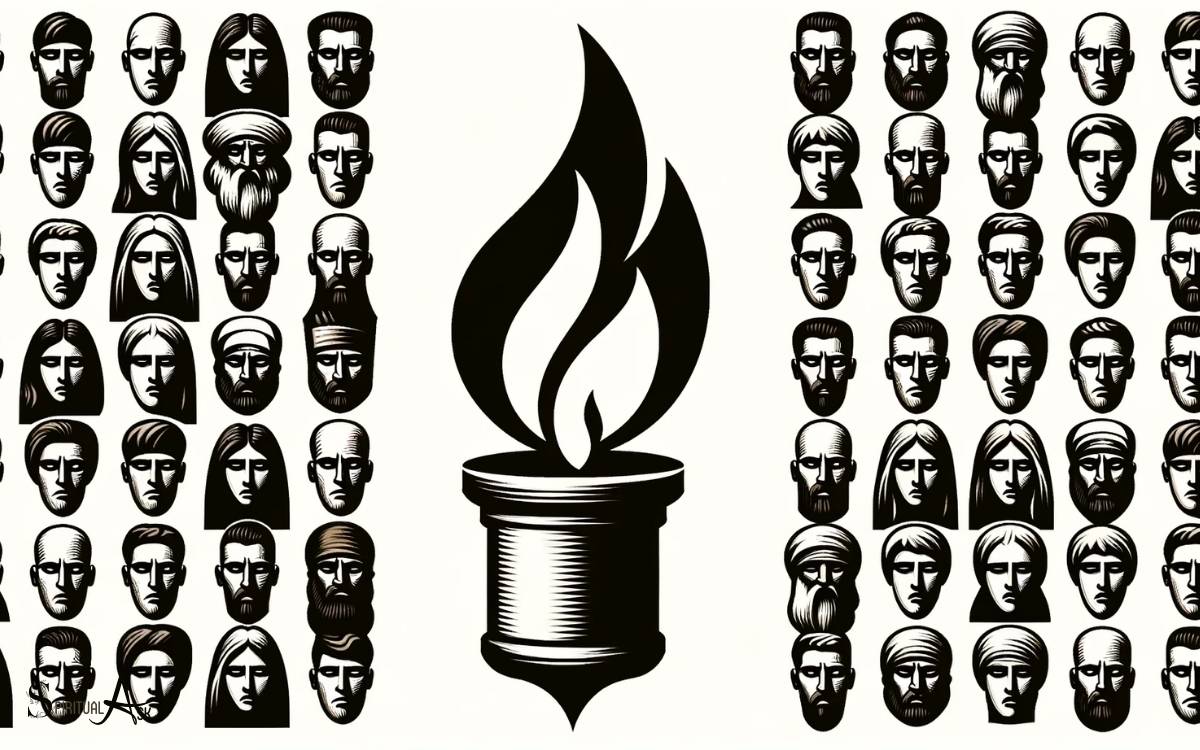Is Martyrdom a Spiritual Gift? Yes!
Yes, Martyrdom can be considered a spiritual gift in certain religious contexts. Martyrdom is the act of willingly suffering or dying for one’s beliefs, particularly in religious contexts.
In some faiths, it is seen as a spiritual gift because it signifies ultimate faith and devotion to a higher power.
Martyrdom represents a believer’s unwavering faith and devotion towards their religion, often inspiring others to deepen their own commitment.
While difficult to endure, many believers view martyrdom as a spiritual gift that paves the way to a deeper connection with the divine and promises eternal rewards.

6 Religions: Martyrdom as a Spiritual Gift
| Religion | View on Martyrdom | Notable Martyrs |
|---|---|---|
| Christianity | Act of faith and testimony | Stephen, Joan of Arc |
| Islam | Noble and praised act | Imam Hussein |
| Sikhism | Self-sacrifice for justice | Guru Arjan Dev Ji |
| Buddhism | Not typically emphasized | N/A |
| Hinduism | Sacrifice for dharma | Prahlada, Padmini |
| Judaism | Sanctification of God’s name | Rabbi Akiva |
Key Takeaway
The Historical Context of Martyrdom
In studying the historical context of martyrdom, I have come to understand its profound impact on religious movements throughout the centuries. Martyrdom has been a pivotal force shaping the beliefs and practices of various faith traditions.
The earliest recorded instances of martyrdom date back to ancient civilizations such as the Greeks and Romans, where individuals were persecuted for their religious convictions.
This persecution continued into the spread of Christianity, with countless believers sacrificing their lives rather than renouncing their faith.
The stories of these martyrs have inspired and galvanized entire communities, solidifying their religious identities and convictions.
Understanding the historical roots of martyrdom provides insight into the enduring power of faith and the lengths to which individuals are willing to go for their beliefs. This historical context sets the stage for exploring the diverse religious perspectives on martyrdom.
Religious Perspectives on Martyrdom
From a religious standpoint, martyrdom is often viewed as a divine calling, a way to demonstrate unwavering faith and commitment to one’s beliefs.
It is seen as the ultimate sacrifice, a willingness to endure suffering and even death for the sake of upholding religious principles. Understanding the religious perspectives on martyrdom sheds light on the significance it holds within different faith traditions.
Martyrdom as Divine Calling
As a Christian, my understanding of martyrdom as a divine calling is rooted in the teachings of Jesus and the early church. The concept of willingly sacrificing one’s life for the sake of faith is deeply ingrained in Christian theology and history.
When considering martyrdom as a divine calling from a religious perspective, several key points come to mind:
- Sacrificial Love: The idea of laying down one’s life for others, as exemplified by Jesus, is a central tenet of martyrdom.
- Eternal Reward: The belief in an eternal life and heavenly reward for those who endure persecution and martyrdom strengthens the conviction in martyrdom as a divine calling.
- Inspiration for Others: Martyrdom is seen as a powerful testimony of faith, inspiring others to hold firm to their beliefs even in the face of adversity.
- Divine Purpose: The understanding that martyrdom serves a higher divine purpose, contributing to the spread of faith and the advancement of God’s kingdom.
Martyrdom as Ultimate Sacrifice
Considering the significance of martyrdom as a divine calling, my understanding of it as the ultimate sacrifice is deeply rooted in the teachings of Jesus and the early church.
In Christianity, martyrdom is viewed as the ultimate act of faith and devotion to God. Jesus himself is seen as the ultimate martyr, willingly sacrificing his life for the salvation of humanity.
The early Christian martyrs, such as Stephen and Polycarp, exemplified this same spirit of self-sacrifice, choosing death over renouncing their faith.
Their willingness to endure persecution and death rather than compromise their beliefs is a central tenet of martyrdom in Christianity.
This perspective on martyrdom emphasizes the profound commitment to one’s faith and the willingness to make the ultimate sacrifice for one’s beliefs.
Martyrdom in Different Faith Traditions
In my exploration of martyrdom, I have encountered diverse, deeply-held beliefs about martyrdom in different faith traditions.
- Christianity: The concept of martyrdom is rooted in the belief that sacrificing one’s life for the faith is the ultimate act of devotion, inspired by the actions of early Christian martyrs.
- Islam: Martyrdom, known as Shahada, is viewed as a noble and blessed death, with martyrs believed to receive a special status in the afterlife.
- Sikhism: Martyrdom is revered as an act of courage and righteousness, with historical martyrs held in high esteem for their sacrifice in upholding religious freedom.
- Buddhism: While not traditionally focused on martyrdom, some Buddhist traditions revere those who sacrifice their lives for the benefit of others, viewing it as an embodiment of compassion and selflessness.
Martyrdom and Spiritual Sacrifice
As we explore the concept of martyrdom as a spiritual gift, it’s crucial to consider the idea of martyrdom as a form of spiritual devotion.
Sacrificing one’s life for a greater spiritual cause is often viewed as an ultimate act of faith and dedication.
This aspect of martyrdom raises thought-provoking questions about the role of sacrifice in spiritual growth and the significance of such devotion in various faith traditions.
Martyrdom as Spiritual Devotion
Martyrdom exemplifies the pinnacle of spiritual devotion and sacrifice. It’s a profound demonstration of unwavering faith and commitment to one’s beliefs, even in the face of extreme adversity.
When considering martyrdom as spiritual devotion, several emotions come to mind:
- Admiration: I can’t help but admire the strength and courage displayed by martyrs who willingly endure suffering and persecution for their beliefs.
- Inspiration: Their unwavering commitment to their faith inspires me to re-examine my own dedication and devotion in life.
- Sadness: It’s heartbreaking to think about the sacrifices made by martyrs and the pain they endure, highlighting the depth of their commitment.
- Hope: Despite the tragic circumstances, there’s a sense of hope in the martyr’s sacrifice, serving as a testament to the enduring power of faith and spiritual devotion.
Sacrifice for Spiritual Growth
Admiring the strength and courage of martyrs who willingly endure suffering and persecution for their beliefs, I recognize the profound impact of sacrifice for spiritual growth. Sacrifice, whether small or great, is a universal concept in spiritual development.
It often involves letting go of personal desires and comforts for the sake of a higher purpose, leading to inner transformation.
In the context of martyrdom, the ultimate sacrifice of one’s life for deeply held beliefs serves as a profound example of spiritual dedication and unwavering faith.
The willingness to endure persecution and suffering for spiritual principles can inspire others to strengthen their own convictions and deepen their spiritual connection.
Such sacrifices can lead to a heightened sense of purpose and a greater understanding of one’s beliefs, fostering spiritual growth and resilience.
The Controversy Surrounding Martyrdom
Controversy surrounding martyrdom often arises due to conflicting interpretations of its significance and ethical implications. It’s a complex issue that stirs up strong emotions and differing perspectives.
Here are some reasons why the controversy persists:
- Ethical Dilemmas: The act of willingly sacrificing one’s life raises ethical questions about the value of life and the righteousness of such actions.
- Religious Interpretations: Different religious beliefs and interpretations shape how martyrdom is viewed, leading to conflicting opinions on its spiritual significance.
- Social and Political Context: Martyrdom is often entwined with social and political movements, leading to debates about its impact on these spheres.
- Personal Convictions: Individuals hold deeply personal beliefs about martyrdom, which can spark intense debate and division.
Navigating the controversy requires open-mindedness and empathy towards differing viewpoints.
Martyrdom’s Impact on Faith Communities
Experiencing martyrdom’s impact on faith communities brought about a profound transformation in my understanding of sacrifice and devotion.
Witnessing the unwavering faith and courage of individuals facing persecution for their beliefs has deeply impacted the way I view my own spiritual journey.
The martyrdom of members within a faith community serves as a powerful testament to the strength of conviction and the willingness to endure suffering for one’s beliefs.
It fosters a sense of solidarity and unity among believers, inspiring a collective commitment to upholding the principles of their faith. This sense of unity and collective commitment can also be seen in the apostleship spiritual meaning, which emphasizes the duty of believers to spread the teachings of their faith and serve as ambassadors for their religious community. The apostleship spiritual meaning encourages believers to actively engage in acts of charity and outreach, promoting the values and principles of their faith to others. By embracing the apostleship spiritual meaning, believers are able to deepen their connection to their faith and find purpose in actively contributing to the betterment of their community.
Additionally, martyrdom’s impact extends beyond the immediate community, often igniting a renewed fervor in the broader faith community and prompting introspection on the depth of one’s own commitment.
The sacrifices made by martyrs become a source of inspiration, strengthening the resolve and dedication of the entire faith community.
Are Martyrdom and Compassion Related Spiritual Gifts?
Martyrdom and compassion, while distinct, can intersect as spiritual expressions. Compassion as a spiritual gift involves empathizing deeply with others and acting to alleviate their sufferings.
Martyrdom, historically recognized as the ultimate sacrifice for one’s faith, showcases an extreme form of spiritual devotion and can be rooted in a deep sense of compassion for others and commitment to one’s beliefs.
Here’s how they relate:
- Rooted in Love: Both gifts emerge from a place of profound love and selflessness.
- Service and Sacrifice: They manifest in actions aimed at serving others and, at times, involve personal sacrifice.
- Spiritual Impact: Both can inspire and deepen the faith of others, showing the power of divine love in action.
“The essence of compassion as a spiritual gift is to love others deeply, reflecting the compassionate heart of God towards humanity. ” Compassion not only serves to uplift those in need, but it also fosters a deeper connection between individuals, enhancing their understanding of one another’s struggles. For those seeking to express this gift, exploring spiritual gift writing ideas can provide inspiration for sharing their personal experiences and insights. Ultimately, cultivating compassion not only enriches our own spiritual journey but also creates a ripple effect of kindness throughout our communities.
To cultivate compassion as a spiritual gift, one can engage in acts of kindness, seek to understand others’ experiences, and pray for a heart attuned to the needs around them.
Through such practices, the gift of compassion not only benefits others but also enriches the giver’s spiritual journey.
Understanding Martyrdom as a Spiritual Gift
Reflecting on martyrdom as a spiritual gift, I find myself contemplating its profound implications on faith and devotion. It is a testimony of ultimate sacrifice, where one’s life becomes a living epistle of steadfast belief and conviction. For some, martyrdom stands alongside other extraordinary manifestations of divine grace, akin to the spiritual gifts cessationists reject, such as prophecy or healing. Yet, its enduring power lies not in debates over theology but in its ability to inspire generations to hold firm in their faith, even in the face of suffering.
It’s a concept that challenges our understanding of sacrifice and commitment, and it raises important questions about the nature of spirituality and the depth of one’s beliefs.
When I consider martyrdom as a spiritual gift, I can’t help but feel a sense of awe and reverence for those who have embraced it throughout history.
The following are some emotional responses and thoughts that come to mind:
- Gratitude for the courage and unwavering faith displayed by martyrs.
- Sorrow for the suffering and persecution endured by those who have been martyred.
- Admiration for the strength and conviction shown in the face of adversity.
- Contemplation of the impact of martyrdom on the collective consciousness of a faith community.
Conclusion
Is martyrdom truly a spiritual gift? As we explore the historical, religious, and cultural perspectives on martyrdom, we can see the impact it has had on faith communities and the controversy surrounding it.
But ultimately, the question remains: can martyrdom be understood as a spiritual gift, a sacrifice that brings meaning and purpose to those who embrace it? The answer may lie in the hearts and minds of those who continue to grapple with this complex and profound concept.






